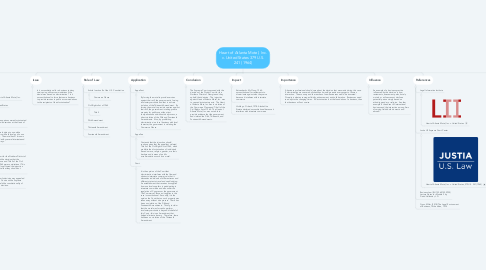
1. Facts
1.1. Parties
1.1.1. Appellant: Heart of Atlanta Motel, Inc.
1.1.2. Appellee: United States
1.2. What happened?
1.2.1. African-American patrons were discriminated against and denied services at the Heart of Atlanta Motel.
1.2.2. The motel offers lodging to non-white transient lodgers who are local and to non state residents. The motel has 216 rooms and is surrounded by several interstate and intrastate highways.
1.3. Procedural History
1.3.1. The District Court for the Northern District of Georgia upheld the decision that the Commerce Clause and Title II of the Civil Rights Act of 1964 were constitutional. This District Court also affirmed the injunction against the motel that they should not discriminate.
1.3.2. The District Court's decision was appealed to the Supreme Court and the Supreme Court also upheld the constitutionality of the prior courts decision.
2. Issue
2.1. Is it unconstitutional for a business to deny services in public accommodations if the denial was based on discrimination? Is it unconstitutional to force that same business to provide services in public accommodations to the recipients of the discrimination?
3. Rule of Law
3.1. Article I section 8 of the U.S. Constitution
3.1.1. Commerce Clause
3.2. Civil Rights Act of 1964
3.2.1. Title II
3.3. Fifth Amendment
3.4. Thirteenth Amendment
3.5. Fourteenth Amendment
4. Application
4.1. Appellant
4.1.1. By forcing the motel to provide services against their will, the government is forcing involuntary servitude and that is a direct violation of the Thirteenth Amendment. By forcing the motel to provide services against their will, the government is taking private property for public use without just compensation and without due process, a direct violation of the Fifth and Fourteenth Amendments. Also, by prohibiting discrimination in a local business with local character, the government is violating the Commerce Clause.
4.2. Appellee
4.2.1. Contends that the injunction should continue given that the appellant violated Title II of the Civil Right Act of 1964, which prohibits the discrimination of individuals based on race, religion, gender, or ethnic background in areas of public accommodations such as a motel.
4.3. Court
4.3.1. It is the opinion of the Court that discrimination interferes with the flow and obstructs interstate commerce in that it dissuades individuals of different races and different states to travel and seek lodging. An establishment that receives its supplies from nonlocal suppliers is participating in interstate commerce and also under the regulation of Congress or the government. The Commerce Clause as it applies in this case is constitutional. Secondly, it is the opinion the Court that no such property was taken away without due process. There has been no violation of the Fifth and Fourteenth Amendments. Thirdly, to claim that the motel was forced to perform involuntary servitude is beyond disbelief of this Court - this is an Amendment that helped eliminate slavery. Therefore, there has been no violation of the Thirteenth Amendment.
5. Conclusion
5.1. The Supreme Court concurred with the decision of the District Court for the Northern District of Georgia and they upheld their decision. The injunction against Heart of Atlanta Motel, Inc. was to cease discriminatory acts. The Heart of Atlanta Mote, Inc. was in violation of the Commerce Clause and Title II of the Civil Rights Act of 1964. The Heart of Atlanta Motel, Inc. was not able to provide evidence that the government had violated the Fifth, Thirteenth, and Fourteenth Amendments.
6. Impact
6.1. Katzenback v. McClung, 1964: unconstitutional for restaurants to discriminate against who they serve because it interferes with interstate commerce
6.2. Hickling v. Orbeck, 1978: Alaska Hire Statute declared unconstitutional because it interferes with interstate commerce
7. Importance
7.1. A business professional should care about the decision that was made during this case. If discrimination was never abolished then it would pervade every aspect of human interaction. The economy and the reaches of new businesses would be truncated. Diversity is what encourages fluidity, advancement, and collaboration. Businesses need to adapt to the changing times. If discrimination is at the foundation of a business, then that business will not survive.
8. Influence
8.1. An example of a business practice influenced by this decision is how restaurants, amusement parks, hotels, motels, or airlines cannot decline a potential patron simply based on ethnicity, gender, or religion. Another example is the advent of international business and the interaction among firms of varying fields both domestic and abroad.
9. References
9.1. Legal Information Institute
9.1.1. Heart of Atlanta Motel, Inc. v. United States
9.2. Justia US Supreme Court Center
9.2.1. Heart of Atlanta Motel, Inc. v. United States, 379 U.S. 241 (1964)
